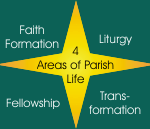

 |
|
 |
|
Homily for July 31st, 2005.
Caution: Putting a Sunday homily on the Website is tricky business. All the viewer has is a written text. A homily, on the other hand, is "an oral event". It may not have been said or heard the way it was written. In addition, a roughly ten-minute homily is part of a roughly one-hour worship event in which God and God's people communicate with each other by means of ritual, symbol, song, proclamation, prayer. Not everything in these homilies is original. As a homilist, I rely on and at times borrow from other homilists and writers who are not properly mentioned in this format. I am often indebted to them. Father William Marrevee, s.c.j.
18th Sunday Ordinary Time A Based on the responsorial psalm of this Sunday One of the commentators I consulted called this part of psalm 145 an innocent table prayer. It is the believer’s grateful response to life experienced as grace-filled, as rich with blessings. It is an appropriate response to the simple facts of having food on the table and of having the necessities of life provided. We can take these simple facts for granted. We may even argue: we have worked hard for them, why should we be grateful? The believer, however, is prepared to acknowledge that the source of these blessings in life is God’s tender care for us. Having food on the table, having the basic necessities of life provided is God’s way of bestowing blessings upon us. This is the way God shows himself to be gracious, merciful, slow to anger, abounding in steadfast love, good, compassionate. This is the way God gives, shares God-self with us as God’s beloved people. For the believer life is held together, we are sustained by a God who is faithful, who can be counted on. All this is prayerfully acknowledged in this psalm. What is on display in this psalm is a faith that is trustful, innocent, child-like. The same commentator that called this psalm an innocent table prayer also suggested that we use this psalm carefully. He called the psalm a prayer for the well-off. The way he puts it: “The prayer basks in our well-offness.” It is not difficult to live a life of gratitude when life is relatively smooth for us, when we know ourselves blessed in many ways. But what about those whose lives are troubled or threatened? After all, we know persons and communities whose experience of life is painful, even chaotic. Their experience of life contradicts what is expressed in the psalm. For them too there is a prayer form in the psalms that gives expression to the pain and chaos experienced in life. It is the so-called prayer of lament that we may take a look at another time. As for the psalm of today persons and communities that experience life as painful and chaotic may still want to use the psalm, but then in hope that God’s good intentions for all of us will finally triumph. Then it can become a prayer of hope for transformation, a prayer that God’s purpose for us all may show itself to be resilient in such a way that the inadequate present arrangement will be overcome for all God’s beloved people. Then, finally, the desire of every living thing may indeed be satisfied by God’s unrelenting care for us. For some that is in part already true for some of us some of the time. For others, many others, it is still a prayer, a hope-filled prayer, not as wishful thinking, but based on God’s faithfulness to us all. |
|||||
| © Copyright 2025 Our Lady of Victory / St-Malachy Site
490 Charles Street • Gatineau • Quebec • J8L 2K5 Telephone: (819) 986-3763 Website powered by Arvixe Web Hosting |